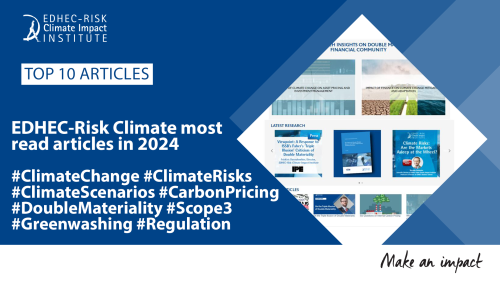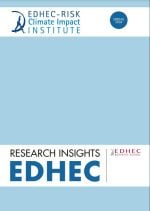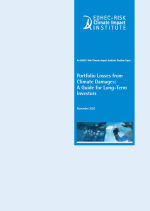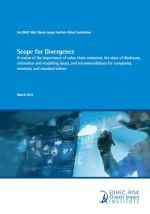
Top 10 Most Read Articles from EDHEC-Risk Climate in the First Half of 2024
Written on 10 Jun 2024.

As we move into the Summer, a period of reflection and anticipation, EDHEC-Risk Climate Impact Institute takes a moment to look back at the most-read articles in the past 6 months. These articles cover a diverse range of topics at the heart of our expertise (climate change, climate risks, climate scenarios analysis, greenwashing regulation, double materiality, sustainability reporting, Scope 3 emissions, and carbon pricing).
#1 Portfolio Losses from Climate Damages: A Guide for Long-Term Investors
In this piece, Riccardo Rebonato carefully examines the (de)merits of the advice given to pension trustees, and engages with critics who assert that pensions are being put at risk by the flawed research and groupthink of climate economists.
His research concludes that pension trustees have indeed been poorly served by their consultants. He also concurs with critics’ views that the estimates of likely portfolio losses due to climate change in the authorities’ reports are implausibly tame. However, his research offers a different and more nuanced perspective about how these conclusions have been reached and the use of dynamic integrated climate-economy (DICE) models.
By Riccardo Rebonato, Scientific Director, EDHEC-Risk Climate Impact Institute and Professor of Finance, EDHEC Business School
#2 Bridging the Gap: Making Climate Scenarios Fit for Investors
EDHEC-Risk Climate Impact Institute Scientific Director Riccardo Rebonato offers a concise overview of key findings from the foundational White Paper from our research programme on modelling the impact of climate change on asset prices. The article delves into the crucial role of scenario analysis and stress testing in grasping the economic consequences of climate change on asset valuation. It explains how we enhance the powerful IPCC framework with probabilistic data to improve its relevance for risk and investment practitioners. It shows how empirical analysis is used to identify strong relationships between economic, demographic, and technological variables and how we derive valuable insights into the likelihood of various climate outcomes, including extreme events. By offering distributions of climate scenarios, such as temperature variations, damages, and cash flow impairments, this novel framework equips financial decision-makers with vital tools to effectively manage climate-related risks.
This Feature by Riccardo Rebonato, Scientific Director at EDHEC-Risk Climate, was originally published in the Institute's February newsletter.
#3 Does Climate News impact Green and Brown Stocks?
Investors need to be mindful of the potential impact of climate change on asset prices. Following pioneering work by Nobel Prize Robert Engle, a number of papers have examined the link between climate news and equity market returns with a view to isolating “climate beta” that could be used to construct climate-risk hedging portfolios with easy-to-trade assets. However, this study applies the latest natural language processing methods to construct climate news indices from newspaper articles. Linguistic dictionary, lexical sentiment-based techniques, and state-of-the-art transformer-based models are used to capture climate change concerns in leading newspapers over the 2005-2021 period. In this article, Professor Dominic O’Kane, Research Director at EDHEC-Risk Climate, and his co-author investigate the use of climate news as a measure of climate risk.
The research from which this article was drawn was produced as part of Amundi “Measuring and Managing Climate Risks in Investment Portfolios” research chair at EDHEC-Risk Climate Impact Institute.
#4 Greenwashing Regulation
The demand for investments integrating Environmental, Social, and Governance (ESG) dimensions has increased significantly in the past decade and the assets that financial intermediaries claim to manage responsibly and sustainably have close to trebled, reportedly growing to represent a third of overall assets under management. However, the industry-accepted definition of sustainable and responsible investing is nothing if not inclusive. As incorporating ESG issues into investment management now suffices to claim the responsible investment badge, the industry welcomes a dazzling array of strategies with heterogeneous objectives, potential sustainability contributions, and methodologies. Furthermore, there remains considerable disagreement in respect of basic terminology across jurisdictions, voluntary standard setting bodies and industry associations. Regulating sustainability claims and mandating appropriate disclosures are required to protect investors from confusing or misleading claims and to facilitate the matching of investment products with sustainability preferences. Beyond investor protection, such regulation could accompany the integration of sustainability concerns by businesses through better capital allocation and stewardship.
This editorial by Frédéric Ducoulombier, Director of EDHEC-Risk Climate Impact Institute, was originally published in the February newsletter of the Institute.
#5 Measuring the Greenness of Green Bonds?
With the growth of green bonds as an asset class, the certification of the actual climate footprint of projects financed with these bonds is gaining momentum among investors and policymakers. The authors investigate the informative content of Second Party Opinions (SPOs) issued by external reviewers who assess the quality of green bonds by collecting a global sample of over 1200 corporate green bonds and analysing matching results for 336 of them. They show that the market assigns a premium to the green bonds with the best SPOs' valuation - namely, the “dark” and “medium” green bonds. However, in presence of a formal credit rating, SPO external reviews do not appear to incorporate distinctive information priced by the market. Using a difference-in-difference approach, they find that stricter green investment regulations, like the adoption of the “EU Taxonomy,” produce a “fly-to-quality” effect that widens the spread between dark and lighter green bonds' returns.
This industry analysis article by Gianfranco Gianfrate, Director of Research at EDHEC-Risk Climate Impact Institute, has been originally published in the February newsletter of the Institute.
#6 Scope for Divergence – The Status of Value Chain Emissions Accounting, Reporting and Estimation and Implications for Investors and Standard Setters
The number of companies disclosing estimates of greenhouse gas emissions in their value chains is set to increase rapidly in the second half of the decade as mandatory climate reporting ramps up in key jurisdictions and more companies are enticed or pressured by capital providers, business partners, and customers to produce such emissions. While value chain emissions are widely regarded as critical to understanding an organisation’s climate-related impact and transition risks and opportunities, the perspective of their inclusion in the scope of a US Securities and Exchange Commission (SEC) climate disclosure rule has led to unprecedented backlash against the integration of sustainability issues into financial management. In this piece, the author explains why value chain emissions matter; describes the state and future of corporate value chain emissions disclosure; discusses estimation and modelling challenges; and concludes with recommendations for investors and standard setters.
#7 EDHEC Research Insights supplement to Investment & Pensions Europe IPE

The inaugural EDHEC-Risk Climate Impact Institute issue of the EDHEC Research Insights supplement to Investment & Pensions Europe presents groundbreaking research extending climate scenario analysis. The current framework, designed to inform public policy, cannot properly serve the needs of investors: alternative scenarios are presented without probabilities and fail to convey the uncertainty in climate outcomes. Our lead article demonstrates how to create probability distributions of climate outcomes, helping investors appreciate the degree of uncertainty they face and determine which potential realizations should command greater attention. Building on these advances, two related articles highlight underappreciated risks that investors need to be aware of. In the wake of the SEC's decision to mandate climate disclosures, another two articles examine the relevance, limitations, and risks associated with disclosures of internal carbon prices and value chain emissions. A final contribution, supported by Amundi, explores how weather events influence mutual fund managers' investment decisions.
#8 Climate Risk Integration: A Global Investor Concern
In this interview, Felix Goltz, Research Director at Scientific Beta, discusses the integration of ESG in factor investing, the pivotal role of academic research and the important insights gained over the years, the strategic shifts in research themes to meet investors' evolving needs, the rationale behind Scientific Beta's climate index series, and the Scientific Beta and EDHEC-Risk Climate Impact Institute research chair established recently to further research into climate risk modelling.
The Scientific Beta “Upgrading Climate Scenarios for Investment Management” research chair at EDHEC-Risk Climate Impact Institute is a new long-term research effort, part of the EDHEC-Scientific Beta Advanced Climate Investing Initiative, which aims to address the pressing need for fit-for-purpose tools to integrate climate risks into investment management.
This interview with Felix Goltz, Research Director at Scientific Beta, has been originally published in the February newsletter of the Institute.
#9 Assessing the RCP / SSP Framework for Financial Decision Making
The SSP/RCP framework is a powerful construct which has been central to how policymakers develop mitigation strategies and which has been embraced by financial community. However, the authors believe that the scenarios which are developed using a series of models should be subject to scrutiny using well established model risk management approaches. Specifically, the framework is deliberately built as a set of scenarios with no associated probabilities, which is challenging for investors to use meaningfully with no view as to likelihood, dispersion and risks around the single paths. They highlight areas where the design might lead to an underestimation of the risk, potentially giving rise to a false sense of security on the impacts of climate change and how transition might unfold.
#10 On the Triple Illusion of Double Materiality
In an op-ed published by French reference newspaper Le Monde on 10 October, IFRS Foundation International Sustainability Standards (ISSB) Board Chair Emmanuel Faber represents that the double-materiality approach to sustainability reporting is a simplistic concept whose popularity derives from a “triple illusion.” Mr Faber argues that single or financial materiality is the only type of materiality that can reorient the required funds towards the just transition within the allotted time. He also represents that the ISSB has sufficiently extended the scope of accounting materiality for corporates to become stewards of “human, social, and natural capital" and concludes his Blitz with a call to “put an end to groundless disputes" to “ensure that efforts converge towards the integration of the interdependence between economics and ecology". Interestingly this offensive takes place as the first set of European Sustainability Reporting Standards (ESRS), which have double materiality at their heart, are under scrutiny by the European Commission’s co-legislators prior to definitive adoption. Frédéric Ducoulombier, Director of the EDHEC-Risk Climate Impact Institute, reviews the key elements of this debate.
By Frédéric Ducoulombier, Director of EDHEC-Risk Climate Impact Institute
Stay tuned on our website to be informed on EDHEC-Risk Climate Impact Institute future research.
To subscribe to our complimentary newsletter, please contact: [email protected].









